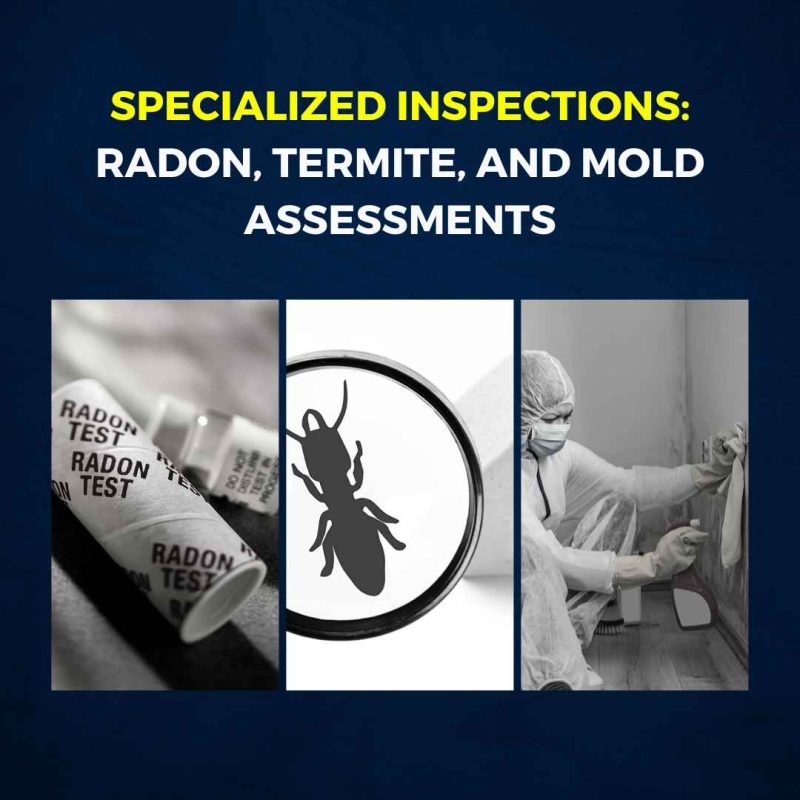When considering a home purchase or ensuring the safety of a current residence, standard home inspections are typically the first step. However, certain environmental and structural concerns require specialized attention. Three of these concerns—radon exposure, termite infestation, and mold growth—can pose severe health and structural risks. This article delves into specialized inspections for radon, termites, and mold, highlighting their importance and what they entail.
1. Radon Assessments
What is Radon?
Radon is a radioactive gas that is colorless, odorless, and tasteless. It is produced naturally when uranium in soil, rock, and water breaks down. When emitted into the open air, radon is harmless; however, when trapped in buildings, it can accumulate and pose significant health risks.
Why is a Radon Inspection Important?
Radon is the second leading cause of lung cancer after smoking. Prolonged exposure to elevated radon levels can lead to serious health implications. Because it’s imperceptible to human senses, testing is the only way to measure radon levels in a home.
The Inspection Process:
Radon testing devices are placed in the lowest livable area of the house, usually the basement, for a specific period. These devices capture and measure radon levels. If detected levels are 4 pCi/L (picocuries per liter) or higher, the EPA recommends taking corrective measures to reduce the radon concentration.
2. Termite Inspections
Why are Termites a Concern?
Termites feed on cellulose-based material like wood, potentially causing extensive structural damage to homes over time. An unchecked infestation can compromise the integrity of a house, leading to expensive repair costs.
A termite inspection involves a thorough examination of a property, both inside and out. Inspectors look for signs of active infestations, damages, and conditions conducive to future infestations. Signs of termite activity include mud tubes on walls, hollow-sounding timber, and discarded wings.
Post-inspection:
If termites are found, extermination processes, often involving chemicals or bait stations, are initiated. In cases of significant structural damage, repairs might be necessary.
3. Mold Assessments
Why is Mold a Concern?
Mold is a fungus that thrives in moist environments. While some mold is harmless, certain types produce mycotoxins that can cause health issues, especially for those with allergies, asthma, or compromised immune systems. Furthermore, mold can damage home structures, eat away at walls, ceilings, and floors, and produce an unpleasant odor.
The Inspection Process:
A mold inspection involves a visual examination of a property, moisture level measurements, and sometimes, air quality tests. Inspectors look for visible mold, signs of water damage, and other conditions conducive to mold growth.
Post-inspection:
If mold is detected, remediation is recommended. This process involves removing the mold and addressing the source of moisture causing the mold growth. Depending on the extent, this can be a simple cleanup or require more extensive measures.
Conclusion
While general home inspections provide a broad overview of a property’s condition, specialized inspections target specific, often hidden, hazards. Radon, termite, and mold assessments are essential due to the potential health and structural risks each poses.
If you’re buying a home, it’s wise to consider these specialized inspections as part of your due diligence process. For those living in their homes for extended periods without such assessments, it might be time to re-evaluate. Regular inspections can ensure a safe living environment and can prevent potential future financial burdens caused by structural damages or health issues.
In all cases, it’s essential to choose certified professionals for these assessments. Their expertise ensures accurate detection and guidance on subsequent necessary actions, safeguarding both your home’s integrity and your health.

